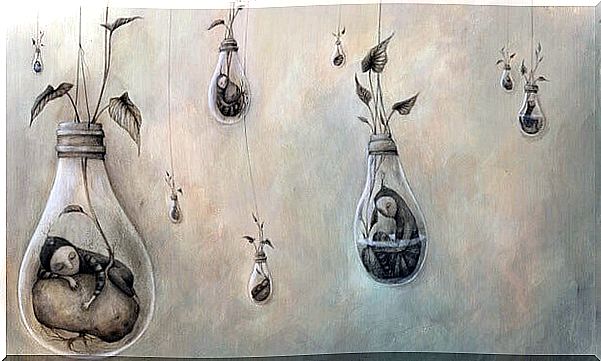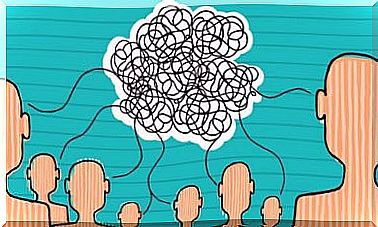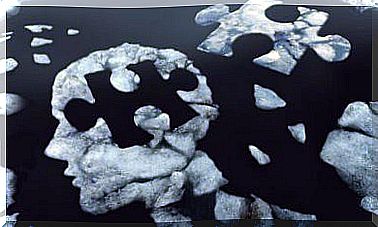Smart People Are Often More Insecure

Intelligent people are often more thoughtful, meticulous, doubtful and insecure. The most arrogant profiles characterized by personal overestimation are, on the other hand, safe by nature, because they do not consider the consequences of their actions and do not measure the effect of their words. In fact, they don’t care about the harm they can cause to other people.
It is often said that “ignorance is the key to happiness”. Surely we will all agree with this idea, because we will have stumbled upon the typical essence of human stupidity that induces to act with complete emotional and rational negligence, unaware of the effect of certain behaviors.
However, and although most of us know how to recognize an “ignorant”, one who acts with evident pride, presumption and arrogance, the question often arises: why do they continue to have so much power in our most common scenarios? Historian Carlo Maria Cipolla used to say that sometimes we underestimate the large amount of stupid people in the world, but to this statement we should add another … why has stupidity reached such high levels of power in our society?
Psychologists and sociologists tell us that there is a curious aspect associated with this behavioral profile. The most foolish people usually show great confidence, are more vehement, more “noisy” and have the ability to influence others because of these traits.
Intelligent people, on the other hand, often have a strong insecurity due to a high latency of response, reflection and even personal discretion. All these dimensions do not create a strong impact. We live in a world where insecurity continues to be seen as a negative characteristic.

Smart people often underestimate themselves
We continue to have a partially erroneous conception of intelligent people and, above all, of those with a very high IQ. We see them as competent men and women, capable of always making the best decisions or of being highly effective in their tasks, responsibilities and daily obligations.
There is, however, a detail present on many occasions: intelligent people often suffer from social anxiety. They rarely feel completely integrated in a given context: school, university, work, etc. As psychiatrist and neuroscience doctor Dean Burnett explains , the profile characterized by high intelligence is usually underestimated all the time.
This attitude is known as the impostor syndrome, a disorder in which the person minimizes his successes and personal abilities to the point of gradually undermining his self-esteem and self-confidence. Obviously it cannot be generalized, as there are people with high IQ who show great confidence and who have climbed the top of success with aplomb, constancy and psychological effectiveness.
The aforementioned pattern, however, is very common: intellectually bright people have a deeper perception of reality, a reality that is not always easy to accept or pleasant, even less reliable.

Is insecurity really such a bad dimension?
We have to admit, personal safety attracts and motivates. We like people who are able to decide quickly, show aplomb and a quick ability to react in all circumstances. However, is it really correct and even desirable to always be so confident?
The answer is “yes, but no”. The solution lies in moderation, in balance. Quoting neuroscientist Dean Burnett again, it is worth mentioning one of his most famous books Idiot Brain . In it he explains that in general the most naïve or “stupid” people are those who show a higher level of personal security. These are profiles unable to recognize a problem or to apply analytical and reflective thinking to prioritize the effect of certain decisions, actions or comments.
The “idiot personality”, however, and this is the strange and worrying aspect, often enjoys greater social success. Managers, senior officials or politicians who show vehemence, confidence and firmness in their decisions usually agglutinate what many consider “leadership skills.” Accepting it is a real danger, because sometimes we put our future in the hands of people unable to evaluate the consequences of its actions.

Production insecurity
The insecurity that blocks and immobilizes us is not helpful. The one who whispers to us “stop, be cautious and think before you decide”, on the other hand, can be of great help as long as it helps us make a decision and not stop us indefinitely.
Intelligent people often have great difficulty in managing this insecurity, because, as mentioned, they have low self-esteem in addition to one of the following dimensions:
- They excessively analyze every event, fact, word said, gesture or attitude.
- They present an “aroborescent” thought, that is, they pass from one idea to another and then to another one until they remain eternally absorbed in mental states with no way out.
- They are very logical people who need everything to be checked, everything to make sense. While life, at times, demands to be accepted as such with its irrationalities, its chaos and its oddities.
In order for insecurity not to isolate them in the immobility of their sophisticated minds, intelligent people must learn to tolerate uncertainties, the imperfection of human behavior, as well as the lack of logic of many events in this world.
In addition to this, it is vital that their intelligence crosses the eminently “rational” frontier to reach the emotional intelligence with which to stop underestimating or self-perceiving themselves as strange beings, extraneous to a reality that, even if they do not believe it, needs to be them more than ever to overcome the “human stupidity virus”.
Images courtesy of Francesca Dafne









